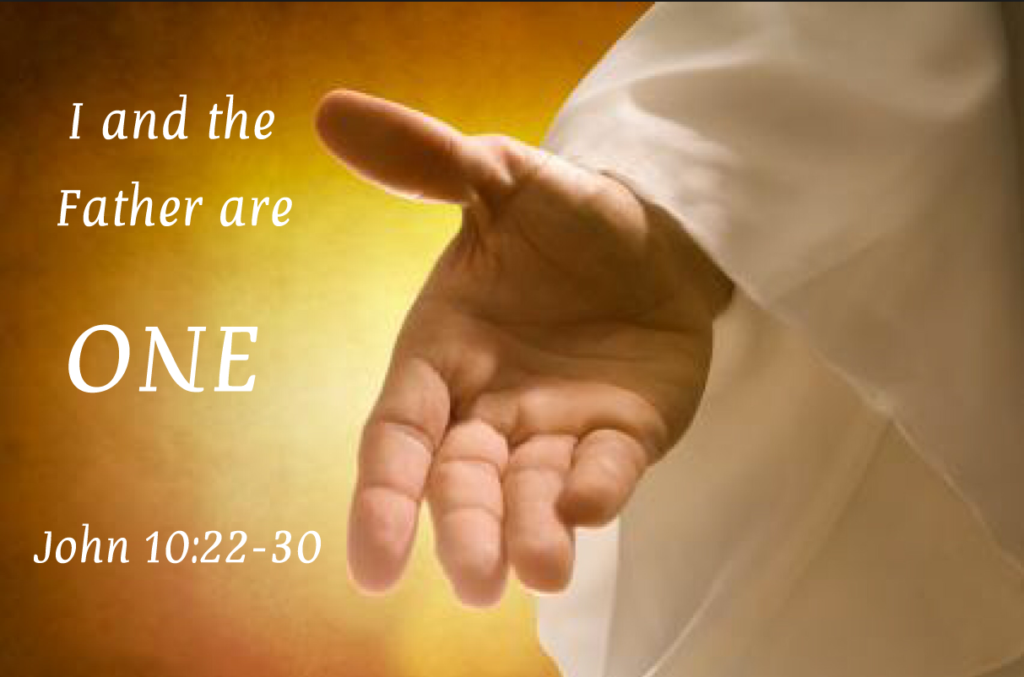I AND MY FATHER ARE ONE (i)

THE HAND THAT BROUGHT THE GRACE OF GOD TO MANKIND
Beyond the contextual apprehension of John 10:30, “I and my Father are one;” is the esoteric profundity couched by Jesus to unveil the truism that characterizes the personage of the Revelator.
Jesus did not use the personal pronoun, ‘my’ which happens to be the translators’ insertion. ‘My Father’ looks, therefore, like ‘the Father,’ with the definite article. Now, the thing is: If Jesus Christ were not God, could he have said these words without being guilty of blasphemy? The word ‘are,’ esmen, is a plural masculine gender. So, by the utterance of “we are one,” it is meant: in nature and essence, and perfections, particularly in power; since Christ is speaking of the impossibility of plucking any of the sheep, out of his own and his Father’s hands. Whatever is in His Father’s hand is also in His hand. He is as protective as His Father is.
The Jews asked Jesus in the twenty-fourth verse, “If thou be the Christ, tell us plainly.” So, what you read in the 29th “My Father, which gave them me, is greater than all; and no man is able to pluck them out of my Father’s hand;” is a vindication of the mental synchronism that exists between the two of them, attested to by verse 30.
The first word, ‘I’ is the Greek egō (eg-o’): ‘a primary pronoun of the first person ‘I’ (only expressed when emphatic).’ The conjunction, ‘and’ is kai (kahee) it means: ‘and, also, even, indeed, but. Origin: apparently, a primary particle, having a copulative and sometimes also a cumulative force.’ ‘Are’ is an interesting esmen (es-men’): ‘first person plural of “to be” which is indicative of eimi (i-mee’) ‘a prolonged form of a primary and defective verb; “I exist” (used only when emphatic).’ ‘One’ is called heis (hice): (a neuter gender) ‘a primary numeral; one.’

God revealed His covenant name, I AM, to Moses. The Septuagint rendition of I AM is Egō Eimi. Esmen, the plural of Eimi, has helped to reveal more than a Personage in the Godhead just the same way Elohim (Hebraic plural for God) establishes the Trinitarian concept in the Godhead, of Genesis 1:1, “In the beginning God….” The unseen Father in heaven is the Incarnation of the visible Revelator whom Isaiah prophetically called ‘The everlasting Father’ in chapter nine of the sixth verse of his Book. ‘I AM THAT I AM’ is what we call JEHOVAH. My first son, at about age eight to ten, told me how overwhelmed he felt anytime I defined JEHOVAH which is ‘self-existence’ or, better still, in the mind-blowing, ‘A One who exists by His own power’, which my son finds too ecstatically overpowering! This is the revelation of Jesus! The Incarnate God.
Jehovah does not mean, ‘one who comes into existence’ for ‘to come’ will give an impression of chronological timing. It is anti-theology to equate God with time. It gives an illogical opinion of the Divinity. It is an insult to place God and time side by side as equals. He had been in existence before creationism. He created eternity from which He drew out time for our use. He did not come into existence; He is existence Himself. Amen! And this is all I am trying to show anyone who wishes to know more about the Lord, Jesus!
For the information of those who see Jesus as a created being, the grammatical cumulation of kai lends credence to the neuter ‘one’. It cannot be overemphasized: the momentousness of this word ‘one’. “I and my Father are one.” It goes beyond a certain synchronous mental evaluation prowess they exhibit. The rapturous truism of the connotation of this little word ‘one’ is that it is saying that the Christ and the Father are of the same essence! Check out the reaction of the unbelieving religious deportment of the antagonistic Jews. John 10:31, “Then the Jews took up stones again to stone him.” Jesus asked them, in the 32nd verse, “Many good works have I shewed you from my Father; for which of those works do ye stone me?” Without wasting time, “The Jews answered him, saying, For a good work we stone thee not; but for blasphemy; and because that thou, being a man, makest thyself God” (John 10:33). “I and the Father” is reminiscent of Proverbs 8:22, “The LORD possessed me in the beginning of his way, before his works of old;” and the more appropriate 30th verse, “Then I was by him, as one brought up with him: and I was daily his delight, rejoicing always before him;” as if they share a common paterfamilias as they grew up to, and from, adolescence to maturity. Let me reveal a gleanable theological truism from “Many good works have I shewed you from my Father” of the 32nd verse of John chapter 10. If the words of Jesus are always true, then what He was telling them is, “Many good works have I shewed you from Myself!” The Father and He are one! Jesus is the attested, “The everlasting Father” of the book of prophet Isaiah.

Emmanuel! The very God of very God!
God’s protocol, the Scriptures, is readily acquiescent to this oneness. When Jesus said, “I am the way, the truth and the life;” in Scripture, the word ‘life’, zoe, in the Greek, which is ‘God’s kind of eternal life,’ gives a connotation of Jesus being the existence Himself! When He made the categorical statement of John 8:58, “Verily, verily, I say unto you, Before Abraham was, I am;” He used the same covenant name of Egō Eimi. This is why I call Him J.J. (JEHOVAH JESUS). When He said, “I am the resurrection,” what He simply voiced was, “Jehovah, the resurrection,” placing His hand of Divinity on His holiest chest: for the avoidance of ambiguity! Mark 2:28, “Therefore the Son of man is Lord also of the sabbath.” This asseveration is pregnant with profundity. (…to be concluded…)
Visits: 167



